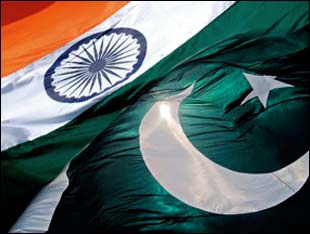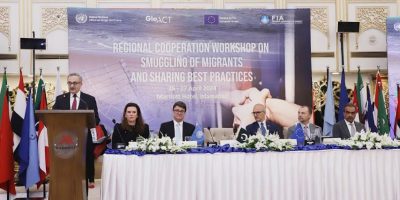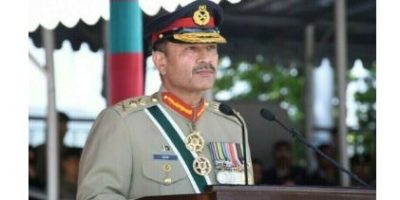Pakistan, India peace meeting calls for eliminating LoC tensions

THAILAND, Aug 11 (DNA): Interlocutors from Pakistan and India have urged the two governments to end the cross-border tensions between the two countries.Pakistani and Indian interlocutors met in Thailand, capital of Bangkok for the 16th Chaopraya Dialogue, organized by Jinnah Institute (JI) and the Australia-India Institute, and discussed the bilateral relations between the two countries.
The Pakistan delegation was headed by Senator Sherry Rehman and its members were Najmuddin Shaikh, Aziz Ahmad Khan, Shafqat Kakakhel; Lt Gen (Retd.) Tariq Ghazi, Daniyal Aziz, Salima Hashmi, Ahmer Bilal Soofi, Dr Moeed Yusuf, Dr Yaqoob Bangash, Khurram Husain, Zahid Hussain, Ahmad Rafay Alam, Fahd Humayun and Salman Zaidi.
On the other hand, the Indian group was led by Prof. Amitabh Mattoo while K.C. Singh, Jayant Prasad, Vivek Katju and G. Parthasarathy; Dr. Mohan Guruswamy, Baijayant Jay Panda, Lt Gen (Retd.) Syed Ata Hasnain, Suhasini Haider, Dr. Happymon Jacob and Dr Malika Joseph, Shoma Chaudhry and Dr Pallavi Raghavan were the rest of the members.
They highlighted the importance to uphold the ceasefire along the Line of Control and Working Boundaries between the two countries’ National Security Agencies (NSAs), Director Generals of Military Operations (DG MOs), Director General of Border Security Force (DG BSF) and Direct General of Pakistan Rangers would end the ceasefire violations for maintaining of peace and security in the region.
The interlocutors of the two South Asian countries welcomed the joint statement issued after the Prime Ministers meeting at Ufa, which agrees that the two states would cooperate in eliminating terrorism from the region. They urged that a mechanism should be formed to deal with terrorism in order to ensure that all bilateral issues, which are to be resolved through dialogue, do not disrupted by such incidents.
They expressed their delight that Indian Prime Minister Narendra Modi had accepted his Pakistani counterpart Nawaz Sharif’s invitation to attend the upcoming South Asian Association for Regional Cooperation (SAARC). The Pakistani and Indian delegations extended their support for a peaceful and stable Afghanistan and urged their respective governments to promote their shared objectives wherever it can.
They have also asked the international bodies to strengthen the National Unity Government and improve the level of economic assistance provided to Afghanistan.
They welcomed the National Unity Government’s enhanced efforts to protect human rights and promote the role of women in all spheres of life in Afghanistan.
The interlocutors showed their concern Islamic State of Iraq and Syria (ISIS) in Afghanistan and the region and requested Pakistan, India, Afghanistan and other countries of the region to join efforts, including intelligence sharing, joint plans and assistance to concerned Afghan agencies to counter this threat.
They encouraged both sides to cooperate on capacity building of law-enforcement agencies, share best practices, and consider if some of these initiatives could be taken up at the SAARC level;
They encouraged the two sides to enter into a Mutual Legal Assistance Treaty (MLAT) in criminal matters based on a model treaty available with SAARC;
They recognized as a general principle that the best defence against radicalization is a robust civil society, rule of law, and moderate public discourse.
The reiterated their strong support for peace and stability in Afghanistan and urged their governments to independently and jointly promote these shared objectives, wherever possible;
They expressed support for the ongoing peace and reconciliation efforts and emphasized that these should remain Afghan-led and Afghan-owned, receiving support from all external and internal stakeholders;
At this moment of critical transition in Afghanistan, they urged support from regional and international actors to strengthen the National Unity Government and enhance the level of economic assistance provided to Afghanistan;
They welcomed the National Unity Government’s enhanced efforts to protect human rights and advance the participation of women in all spheres of life in Afghanistan;
They expressed grave concern at the increasing presence of the Daesh/ISIS in Afghanistan and the region. Recognizing this as a common threat, they called upon all agencies of India, Pakistan and Afghanistan and other countries of the region to coordinate efforts, including intelligence sharing, joint plans and assistance to concerned Afghan agencies to counter this threat;
They underlined the need for both countries to jointly address the problem of drug production and trafficking originating from Afghanistan, which has had an alarming effect on youth in the region.
They welcomed the widening of the Chaophraya dialogue to include alternate histories and narratives, which will help promote a better, informed and nuanced mutual understanding.
Related News

UNODC, Pakistan join hands to combat smuggling of migrants
ISLAMABAD, APR 26 /DNA/ – The Federal Investigation Agency (FIA) and the Ministry of ForeignRead More

Complete independence impossible without economic stability: COAS
RAWALPINDI, APR 26: Chief of Army Staff (COAS) General Asim Munir on Friday said thatRead More


Comments are Closed